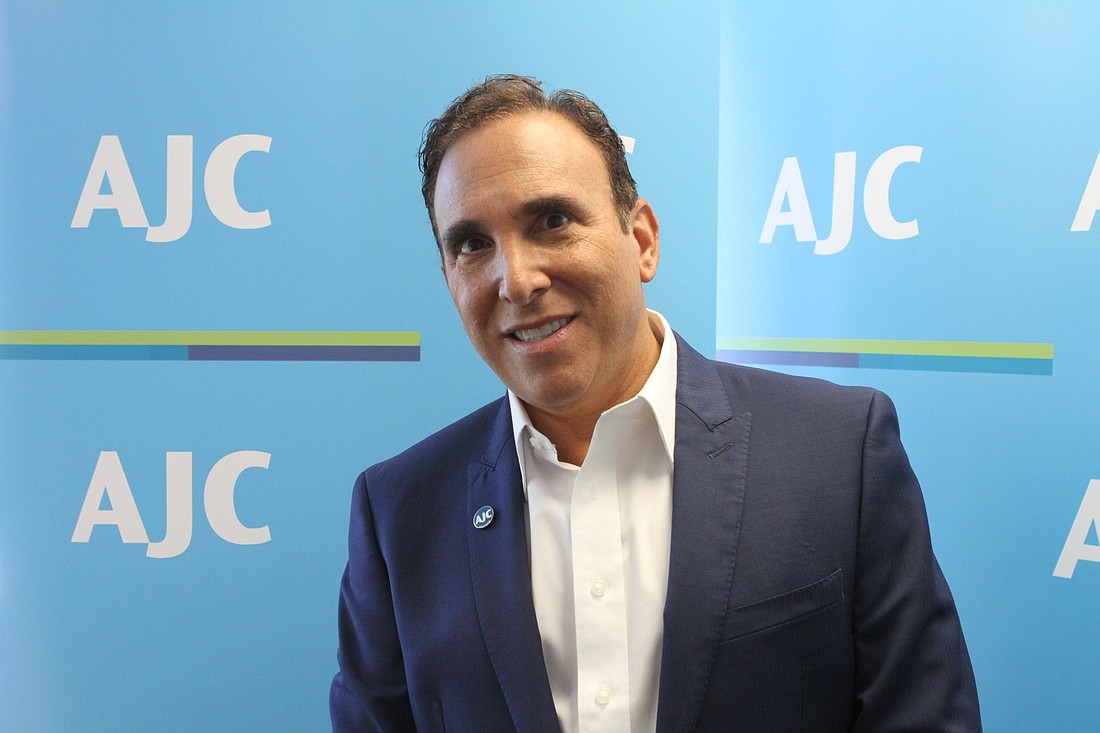- May 14, 2025
-
-
Loading

Loading

Long before those infused with hatred of Jews became active on the internet and social media, some would use the walls of synagogues and other Jewish communal institutions as canvases to express their vile antisemitism. Scrawling or painting Nazi swastikas, salutes to Hitler, and other antisemitic words was a simple way to attack Jews anonymously.
Temple Sinai and Temple Emanu-El were the latest victims, assaulted in the middle of the night July 15 with painted swastikas and messages of hate.
When members of our community awoke to news of the dual attacks, and some delivered their young children to Temple Sinai, where the graffiti was still visible, it naturally prompted conversations and introspection that 75 years after the Holocaust the threat of antisemitism remains and is rising.
Only three months ago, Temple Emanu-El was the target of a similar attack. And in 2016, three swastikas were drawn on a Temple Sinai window. The hurt is a searing reminder -- as if we needed yet another warning -- that the most successful and secure Jewish diaspora in the world is still vulnerable.
Last October, on the anniversary of the Pittsburgh Tree of Life Congregation massacre, my organization, American Jewish Committee (AJC), released the findings of a national survey of Jews on their own perceptions of and experiences with antisemitism in the United States.
88% said antisemitism is a problem in the United States today, with more than a third (38%) calling it a very serious problem. 84% said it had increased – 43% said it had increased a lot – over the past five years.
Significantly, one-third said that the institutions they are affiliated with had been targets of antisemitic attacks, and 22% of them said those institutions were victims of graffiti.
Antisemitism is not a Jewish problem. It is a problem for the entire society. AJC has long believed that fighting hatred and discrimination of one group or people is to fight hatred and discrimination of all people. We were gratified when civic, ethnic, and faith leaders in Sarasota joined with the Jewish community in January in the “No Hate. No Fear” rally the same day that similar gatherings took place in New York and cities across the country to demonstrate solidarity in response to violent attacks on Jews in Brooklyn and Monsey, NY.
We look to our elected officials and law enforcement to not only express empathy with the Jewish community by condemning antisemitism, but to commit resources to take concrete actions to apprehend and bring to justice those responsible and to prevent future attacks.
The Sheriff’s Office has concluded that the dual attacks were the work of a lone perpetrator, seen on security cameras, and is actively seeking him. Thankfully, this perpetrator struck in the middle of the night. But, as we know all too well from the fatal attacks in Pittsburgh and Poway, the line is thin from vandalism or verbal antisemitism to arriving armed during services with the intent to kill.
Hence, Jewish community vigilance alone is not enough. Increased municipal security, as well as education and stronger legislation, are essential.
In 2018, the U.S. Congress passed, and President Trump signed into law, the Protecting Religiously Affiliated Institutions Act, which provided new and strengthened measures to deter, as well as punish, perpetrators of attacks on religious institutions.
Also critical is ensuring that antisemitic incidents are properly recorded locally and then reported to the FBI. Currently, the annual FBI Hate Crimes Statistics report relies on voluntary submissions from local law enforcement agencies.
For the last report, covering the year 2018, more than 90% of Florida law-enforcement agencies told the FBI that no hate crimes occurred in their districts or ignored the request. The FBI reported only 141 hate crime incidents in Florida. In a separate report, the Florida Attorney General’s office recorded 168 hate crimes statewide in 2018. In comparison, states with much smaller populations than Florida recorded more hate crime incidents. New Jersey, for example, had 561.
To correct inadequacies, the bipartisan National Opposition to Hate, Assaults, and Threats to Equality (NO HATE) Act, adopted by the U.S. House of Representatives and now under consideration in the Senate, would improve hate crimes reporting. Department of Justice grants would empower state and local governments to train law enforcement, create reporting hotlines, direct resources to minority communities, conduct public educational forums, and require submitting hate crimes data to the FBI.
Even as our nation confronts the COVID-19 pandemic and racial injustice, we must ensure that combating antisemitism and Jewish community security remain a top priority. Together, in concert with our neighbors and partners, we will assertively combat the cancer of antisemitism.
Brian Lipton is Director of the American Jewish Committee’s West Coast Florida region.